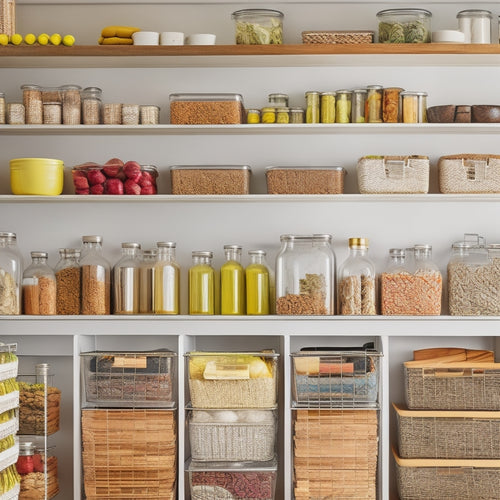
Uncover Food Security Secrets for Survival
Share
Food security is the critical foundation of survival, guaranteeing a reliable supply of nutrients in the face of uncertainty. It begins with understanding key principles, such as emergency preparedness, sustainability, and effective planning. To build resilience, focus on diverse and adaptable food systems, sustainable agriculture practices, and community-led initiatives. Mastering long-term storage techniques, including canning, freezing, and dehydrating, is also essential. By prioritizing food security, you'll be better equipped to navigate emergency scenarios and safeguard your family's well-being. As you explore these concepts further, you'll uncover the secrets to achieving true food security and self-sufficiency.
Key Takeaways
• Prioritize food security by understanding emergency preparedness, sustainable agriculture, and resilient food systems to ensure a consistent supply.
• Diversify your food storage with nutrient-rich, non-perishable items using proper storage methods like canning, freezing, and dehydrating.
• Develop a tailored family food readiness plan, assigning responsibilities and discussing emergency scenarios to ensure collaboration and open communication.
• Learn essential skills like foraging for wild edibles, water purification, and food preservation techniques to navigate emergency food scenarios.
• Promote biodiversity and support local food networks to build a robust and adaptable food system that can withstand crises.
Understanding Food Security Essentials
When it comes to emergency preparedness, understanding the fundamental principles of food security is vital, as it serves as the backbone of any successful survival strategy.
Ensuring sustainability is important, as it allows families to maintain a consistent food supply even in the face of uncertainty.
Effective emergency planning involves identifying potential risks and developing a thorough plan to mitigate them. This includes stockpiling non-perishable items, investing in long-term food storage solutions, and creating a system for rationing and rotating supplies.
By prioritizing food security, individuals can rest assured that they have a solid foundation for survival, even in the most unpredictable scenarios.
Building Resilient Food Systems
A resilient food system, characterized by diversity, adaptability, and redundancy, is essential for withstanding disruptions and guaranteeing a consistent supply of nutritious food during emergency situations.
Building resilient food systems requires a multifaceted approach that incorporates sustainable agriculture practices, supports local food networks, and fosters resilient communities.
By promoting biodiversity, reducing reliance on industrial agriculture, and investing in community-led initiatives, we can create a more robust and adaptable food system.
This, in turn, can help mitigate the impact of disruptions, such as natural disasters or supply chain failures, and guarantee that communities have access to nutritious food when they need it most.
Mastering Long-Term Storage Techniques
Effective long-term storage methods are crucial for maintaining a dependable food supply, as they allow individuals to stockpile nutrient-rich foods that stay safe and edible for extended periods, even in the face of uncertainty or disaster.
By mastering these methods, individuals can ensure their emergency supplies remain fresh and usable, providing a sustainable solution for their families.
Proper storage techniques, such as canning, freezing, and dehydrating, can greatly prolong the shelf life of food, making it possible to build a strong stockpile of essential nutrients.
Navigating Emergency Food Scenarios
Mastering long-term storage techniques is only half the battle, as individuals must also be prepared to navigate emergency food scenarios where access to their stockpiles may be limited or compromised.
In such situations, emergency rations become vital, providing sustenance until normal supplies can be restored. It's crucial to have a cache of non-perishable, high-calorie foods that can be easily transported and consumed.
Food preservation techniques, such as canning, dehydrating, or freeze-drying, can also prolong the shelf life of emergency rations. Additionally, understanding how to forage for wild edibles and purify water can be life-saving skills.
Empowering Family Food Readiness
Every family's food readiness plan should be tailored to its unique needs, taking into account factors such as dietary restrictions, food allergies, and lifestyle habits.
Empowering family food readiness requires collaboration and open communication among family members. This involves discussing and agreeing on emergency food scenarios, identifying essential food items, and assigning responsibilities for food storage and preparation.
Effective pantry organization is also vital, ensuring that food items are easily accessible, visible, and rotated regularly.
Frequently Asked Questions
How Do I Rotate My Food Stockpile Without Wasting Expired Items?
To efficiently rotate your food stockpile, implement a 'first-in, first-out' system, utilizing food storage and organization techniques, while maintaining accurate inventory management and tracking shelf life to minimize expired items and guarantee a safe, usable supply.
Can I Store Food in Plastic Containers or Are They Unsafe?
"While plastic containers may seem convenient, research reveals they can leach chemicals into food, compromising safety. Opt for food-grade, BPA-free alternatives like glass or stainless steel containers for secure food preservation and peace of mind."
What Is the Best Way to Cook During a Prolonged Power Outage?
During a prolonged power outage, opt for outdoor cooking methods like camping stoves, solar ovens, or charcoal grills, and consider alternative food preservation techniques like canning, smoking, or dehydrating to guarantee safe and nutritious meal preparation.
How Much Water Should I Store per Person for Emergency Situations?
For emergency situations, store at least one gallon of water per person per day for drinking, cooking, and hygiene. Consider implementing water purification methods and follow emergency hydration tips to guarantee access to safe and potable water.
Are There Any Food Items That Never Expire or Go Bad?
While it's a myth that certain foods never expire, some non-perishable items like canned goods, dried legumes, and honey can remain edible indefinitely when stored properly using advanced food preservation techniques and ideal long-term storage methods.
Related Posts
-

Rustic Hanging Racks for Country-Style Kitchens
Rustic hanging racks are a game changer for your country-style kitchen, blending functionality with charm. They maxim...
-

Tiered Racks for Kitchen Pantry Organization
Tiered racks can enhance your kitchen pantry by maximizing vertical storage and increasing visibility. They help you ...
-

Under-Sink Storage Bins for Organized Kitchens
Under-sink storage bins are your best bet for an organized kitchen. They maximize unused cabinet space and enhance it...


